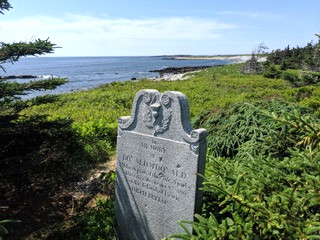Rough and Plenty: A Memorial
As a Nova Scotia commercial fisher in the early 1990s, Raymond A. Rogers experienced the collapse of Canada’s East Coast fishery first-hand. During that difficult, painful, and confusing time, Rogers noticed a lone gravestone across the road from his home in Shelburne County, Nova Scotia. It was the gravestone of Donald McDonald, a native of the Isles of Lewis in what was known as North Britain, who “departed his life” in 1881. The encounter with McDonald’s gravestone inspired Rogers to explore the parallel processes of dispossession and how local communities are decimated by the imposition of new ways of life.
In Rough and Plenty: A Memorial, Rogers compares the experience of dispossession suffered by nineteenth-century Scottish crofters who, like McDonald, were expelled from their ancestral lands during the Highland Clearances, with his own personal experience of dispossession when the fishing industry in Nova Scotia succumbed to the forces of capitalism in the 1990s. The book serves a twofold goal: to memorialize the loss of local ways of life in the name of economic progress and to convey the experience of dislocation through first-hand narratives and perspectives, recent and historical. Blending historical research with personal narrative, the author proposes the act of remembrance as a form of advocacy for the local communities decimated by the power of progress. Further, the comparison between the process of dispossession suffered by nineteenth-century Scottish crofters and the author’s own experience as a Nova Scotia fishers shows how colonizing narratives of progress exploit resources and marginalize local communities and its inhabitants.
There are two frames that organize this work: one frame links the stories of Donald McDonald’s life and my life as our fates were linked together in this landscape/seascape in Southwest Nova Scotia. The other frame is a more formal and historical one that has to do with the dispossession that is central to entrances into modernity for particular groups, and is reflected in how the three sections of the manuscript are set out to convey the increasing enclosure of the commons. For the purposes of this work, fishers and crofters share a similar definition, they are both small-scale artisanal, largely subsistence members of decentralized rural communities. Property rights are informal and largely held in common. In the case of the crofters, they are the descendants of the Scottish clans who had inhabited the Highlands and Islands for generations, but who became “redundant populations” standing in the way of large-scale modern forms of sheep farming and agriculture.

Similarly, as small-scale artisanal participants in an increasingly industrialized fishery, the inshore fishers were eventually seen as inconsequential and inefficient, and when the fish stocks began to collapse, and there was a consensus that there were “too many boats chasing too few fish,” it was the inshore quotas that were cut. This forced the artisanal fishers out of the industry. The privatization of fish quota became an industry-funded down-sizing strategy that rewarded those with the deepest pockets.
This characterization of crofters and fishers as being out of step with the times only gains clear definition when the opposite appears, that is, large-scale industrial operators who are bent on enclosing the commons, so that, as private property, resources can then be better subject to profit and accumulation. The enclosure of the commons and the formalization of private property rights is a central feature of the world of progress and improvement in modernity, and is, at the same time, a process that is so devastating for local communities who became strangers by staying in the same place. The three sections of the book convey the gradual encroachment of these forces on their lives.
In charting the increasing enclosure of fisher and crofter communities within modern economic relations – outlined at the start of each section with a “History From Above” overview – this work contains three main sections that chronicle the intensifying threats to the “rough and plenty” as the commons is enclosed. In each of the sections, the first-hand narrative draws parallels between the world of the fishers and the world of the crofters. The first section is entitled “Hemmed-In Communities” which presents narratives of a “day in the life” of fishers in Little Harbour, Nova Scotia in the mid-1970s and crofter communities in the Isle of Lewis in the early 19th Century, as they live their lives and reflect on the changes they see occurring around them. The rough and plenty still informs how life is lived on a daily basis, but it is clear that forces are gathering to threaten the lives of crofters and fishers.
The second section (“Remittances Home”) draws parallels between the lives of migrant crofters and migrant fishers, both of whom leave home in order to support the diminishing prospects of the communities they are attached to. Parallels are drawn between crofters of the 18th and 19th Centuries who go to the “nor’wast” by signing on as “wintering servants” for the Hudson’s Bay Company, and East Coast fishers who go “out west” to toil as labourers on a hydro project in Western Canada on the Nelson River near Hudson Bay in 1976.
The third section (“Outbreaks of Unrest”) chronicles the strife-ridden resistance by fishers and crofters as they fight against their final dispersal. The crofters in the Scottish Highlands and Islands in the mid-19th Century challenge the authority of the Sheriff’s attempts to deliver “notices to quit” their land, and the inshore fishers of South-West Nova Scotia fight for their survival by blockading a Russian ship in Shelburne harbour in 1993.
As comparative “anatomies of dispossession” that links the world of the fishers and the world of the crofters, this book is meant to highlight the way in which the merciless and self-congratulating power of progress and improvement decimate local communities, with the added insult that the disappearing griefs of this “cloud of living witnesses” are seen as little more than the cost of doing business. By linking the voices of the crofters and the fishers, settler society debates regarding the canoe and the ship may come to see the settler ship as not only an agent of colonialism, but also as a “coffin ship” rife with typhoid fever and cholera, and made up as they are of those dispossessed by the Industrial Revolution and dispersed to far colonial shores. To behold this aggressive agenda from above that links colonial settlement with the expansion of capitalist relations – presented here through the collective voices from below – may alter, I hope, the stories Canadians tell themselves about who we are. Our history is not one of settlers taming and making use of the wilderness, but rather, it is one of dispossessed and displaced souls flung about by powerful forces. In light of this grief and dispossession – and when combined with the more recent multi-cultural dimensions of our citizenry who carry their own stories of dispossession – Canadians may come to more clearly see the displacement these same forces have inflicted on the First Nations who are fighting these same battles.
Outbreaks of Unrest
Similar to the pairing of fishers and crofters as embedded communities under threat in “Hemmed-In Communities,” “Outbreaks of Unrest” links together the narratives of strife and unrest that emerge in the midst of the enclosure of the commons. The mid-19th Century expulsion of the crofters “to the four winds” and their resistance and protest against the collapse of their way is paralleled with the Blockade of a Russian ship in Shelburne, Nova Scotia in 1993, which was the final protest by the inshore fleet as it faced shrinking fish quotas and ecological collapse, and the displacement that accompanied them. These two narratives mark the almost complete decimation of embedded social relations in their lives and the consequent devastation for the “rough and plenty” in these communities.
What links these two communities is that they are regions that were being absorbed into the industrial system. The enclosing forces favoured large corporations and consequently marginalized small artisanal participants. In the fishery, these enclosing measures included the creation of Enterprise Allocations and Individual Transferrable Quotas that privatized shares of fish quota among larger entities, and in the process, eliminated the smaller players from the industry. For the crofters, there was a conviction among land managers at the time that crofters could not pay a rent sufficient to make the land profitable and that the fertile pastures “would be better cultivated and managed and pay better rates when let in large divisions” (Hunter 1976:23). This belief favoured the large farmers, and forced the small lot holders off the land. The social consequences of these new economic relations is recorded in the political strife that is presented here in “Outbreaks of Unrest,” as the crofters and fishers engage in collective resistance from below as they struggle against the forces that are destroying them.
Excerpt from the section “Outbreaks of Unrest”:
Scottish Highlands and Islands Mid-19th Century
History From Above
While the demand for sheep’s wool continued to increase in the 19th Century, the market for kelp collapsed in the 1820s and the attempts to create a local fishery off the coasts of Scotland faltered because of a lack of investment in infrastructure. Having been displaced from their traditional homes in the glens, and with the alternatives of kelping and fishing having failed, the crofters were increasingly seen as an unprofitable burden on the ledgers of the large estates bent on “modernization.” In this context, the crofters were viewed as insular, backward, and plagued by “inglorious self-content.” With no inclination to be incorporated into the new ethos of “improvement,” the only remedy for these “redundant populations” was to forcibly remove them from their traditional lands and send them off to a place where they would no longer hinder the new schemes of the managers.
These forced expulsions generated a series of protests and restiveness among the crofters, with many petitions being sent to Lairds and government officials in which the crofters made their case to stay in their homes. These protests were met with arrests and the criminalization of agitation that, in turn, provided those in charge with increased impetus to rid themselves of these “malcontents.”
Within the larger frame of the links between colonialism and the industrial revolution, there was the simultaneous enclosing of Highland and Island land in Scotland so as to better serve industrial production in Britain, along with the concurrent opening up of large tracts of “empty land” in the colonies of the British Empire. This simultaneity afforded a “solution” for those in charge of the redundant crofters, as they furthered, at the same time, the political aims of land annexation in the colonies. The forces of capitalism and colonialism combined in sending the crofters off to North America, New Zealand and Australia, transforming them in the process from being desolated wayfarers leaving their native shores – and if they survived the clapped-out and disease-ridden ghost ships – arriving in the colonies as agents of empire.
History From Below
“About 300 cottar families were then said to have no regular means of subsistence; I was told they lived on the strong air.”
Edward Charles Stanford (1883:3057)
We are eating an animal that just starved to death. It was our cow. I found her this morning breathing her last, collapsed against the stones of the knocked-down wall of what was the byre. It is our family’s final meal here. Tomorrow it will be the roads, and the day after that, maybe the boats. Whatever happens, the dew will be on our heads.
The proprietor will be rid of us, and that is what he wants. The misery of the last years has finally come to this. We are strangers to the place that has been our home. Some of the crofters who were removed last spring were given allotments on the bogs next to the shore. And so over the summer, famished people have blackened the beaches, like the crew of some vessel wrecked on an inhospitable coast, that they might sustain life by the shell-fish and sea-weed laid bare by the ebb. Many of their allotments were barren in the extreme, unsheltered by bush or tree, and exposed to the sweeping sea-winds, and in times of tempest, to the blighting spray. It was a matter of extreme difficulty to keep the few cattle they had retained from wandering, especially in the night-time, into the better sheltered and more fertile interior that they had known before. The poor animals were intelligent enough to understand the nature of the change effected. And because of the harshness of the shepherds to whom the care of the interior had now been entrusted, the cows added materially to the distress of their unhappy masters. For the animals were getting continually compounded; and vexatious fines, in the form of trespass money, came thus to be wrung from the already impoverished crofters. More and more often now, the animals will neigh from the shepherd’s pens as they recognize their passing owners, who can no longer pay for their release.
Those who did not go to the bog or flee to a foreign land last year were allowed to plant their corn this spring. But soon after that, we were given the order to quit as well. So although we had no home to live in – after much pleading with the Factor – we were being allowed to stay in the district to harvest our crops. Our hope was that after the summer our animals would have recovered from the poor winter and so their valuation would be higher, and that we would have food for the winter, wherever we would find ourselves. We are living outside all summer under an old sail, and are trying to save what we have planted. But when the Factor burned our houses after we left them, the fire also destroyed many of the dykes. And the grass that could have been for our animals was also burned with the houses.

Along with that, the new herdsmen and their dogs hunted us for watching our own corn, while their animals trample our crops. For the last month, we have been obliged to subsist upon broth made from nettles, thickened with a little oatmeal, along with our few remaining potatoes which we cook in the open air amongst the ruins of our former comfortable houses. So we have lost our homes and our land, and now our animals and our crops. We have lived to see ourselves wear out our lives. Meanwhile, more sheep farmers are seen daily traversing the country and viewing our lots, previous to bidding for them. These necessitous strangers appear to be in great fear of rough treatment from us whom they are about to supersede. But events proved they had no cause: we treated them with civility, and even with hospitality.
All of this turmoil began a number of years ago, when the Factor read aloud the new rules of the estate to those who had come to pay their rents on Martinmas. We were gathered by the road outside the public house where we annually pay our rents and are given our receipts. We were fingering the papers on which we had marked our “X” as we came round to hear what the Factor had to say. In a light mist, he unfolded a long document and before beginning to read it, he stated that the proprietor wished everyone well and had set out new rules for the estate so as to insure peaceable relations, as well as to increase efficiency and promote an improved way of life for everyone as we look forward to the future. The Factor then began to read from the document that had to do with all manner of activities on the estate to be overseen by the Ground Officer and Factor, including things such as quantity of stock, use of kelp and driftwood, the building of houses, the cutting of peats, and the uses of our labour, along with the system of fines that would be imposed if we ran afoul of these restrictions.
After reading aloud the rules of the estate, the Factor then produced a paper that he asked each of us to sign, otherwise we would have to quit our places and leave the township. We did not know what to think, but one of us from the place stepped forward and said that we would like to study it more and could we please have a copy to take with us. The Factor did not like this idea, and said no, we could not have a copy, as it belonged to the proprietor. After talking with the Ground Officer, he did give us a week among ourselves to decide what we thought, and said that he would visit the township soon for our answer.
We were left to ourselves and after a time we came round to the idea that although we had heard a great many of these rules here and there, it was something new to hear them all together at one time. Everything set out was apparently on the assumption that the proprietor has to do with a whole population, every one of whom is so dead to self-interest, that directions, restrictions, and written permissions must be given to keep them from running into all sorts of forbidden ways. Someone wondered if not a set of rules for proprietors might be a better idea, since it would save them from committing all the cruelties that were about nowadays in the Highlands and Islands.
These are the kinds of thoughts that we worried about as we discussed the Factor’s rules. It seems to us now after all that has happened, that the grand plans of the Laird and his Factor are putting an end to us. The people of the township will be no more. We will be blown to the four winds. Where once we put out ploughs, briers and moss now grow. The only way young people can live is for the men to sell their days ditching and clearing, and for the young women to go into service and have their morals destroyed. We have almost stopped being church-going people, so changed are we.
Along with these thoughts, we remembered those who are now lost to us. Over the past year, we attended the funerals of a good many of our neighbours who went to the poorhouse, and they got nothing but the funeral of an ass. Recently, an old couple arrived here. They had previously raised a large respectable family, but were now on the side of the road amidst bits of their furniture. The man became distant in the mind and wandered off in the hills. We found him with his Bible under his arm. He was searching for his father, who had died thirty years before.
Among others who have suffered, Neil McDonald was, for no well-grounded reason, evicted from his home and farm by the Factor. He had no other home to go to, and was forbidden by the Factor to build a house in any part of the estate. The Factor also threatened with instant eviction any crofter or cottar who might, out of pity, afford him even one night’s shelter from the cold. So his only place of refuge was a old boat turned upside down, with a hole in the centre for a chimney, and some straw laid round the openings to prevent snow drifts from perishing himself and the little ones. His wife being nigh her confinement, he for her sought shelter in his sister’s house, but the farmer on whose croft the sister’s house stood was instructed by the Factor to turn the sister out. The wife and family were removed, and the woman, while being driven in the cart, by the way was delivered of a child, as no one would be allowed to shelter her during the time of her delivery.
Another man, Hugh McLean was blind, and was disgracefully served an order to quit, but having no house to go to, he was still in his own home. The Factor then sent men to strip the roof off that home by means of instruments of iron. Hugh then removed to the barn, in which lay a quantity of grain. The same men were then sent back with orders to strip the barn too; and the poor blind man, with his crippled wife, and no sons to help him, as they were drowned some time before, and his only other son was insane in the asylum, were cruelly turned out and left at the roadside.
Also there was Neil Black, an old man, who was well-to-do at one time on a farm, and on being evicted, could not get even a cow’s grass, so died a pauper four years ago. He was so poor and so neglected, that when neighbours felt called upon to minister to his necessities and offer him bodily attendance, his flesh was falling off his bones, and he was in so disgusting a state that only stout-hearted men could go near him. The cause was aggravated by there being two sisters in with him, which only added to the distress.

Widow McDonald, also very old, and a pauper, died nearly two years ago, and but for her poor neighbours would have been dead years previously. But they could not prevent all the effects of official neglect, and the woman became diseased for want of attention, and the maggots were alive in her body before she was dead.
Donald Black, at one time a crofter, but being unable to cultivate his land without a horse, gave up, and soon became a pauper. He also died about three years ago, his death having been hastened by want of care, and the consequent filth in and about his bed clothes. He was a prey to heaps of vermin, insomuch that those who in desperation visited him wondered [why] he was not being carried out of his bed by the parasites. His widow died shortly afterwards, and such was her state of body and bedding from the same causes that she besought the neighbours to bring her nettles that she might relieve herself from the irksomeness of vermin with their stinging pain.
It is these things that we discussed as we thought what to do about the Laird’s paper. When the Factor came round among us again, holding a paper in the one hand for us to sign and a notice to quit in the other, he told us that unless we signed this paper agreeing to the regulations, the effect of which was that we would require to be obedient to anything and everything which either he or the proprietor would order us to do, or we would have to quit the place.
We said that we would not sign, and that besides, the good Lord had only ten commandments, and these were hard enough to keep, even with the reward of Heaven to behold. The Factor was offering us much less than that. But in the end we all signed, and we would all chop off our hand rather than sign it now.
Since that time, his mode of procedure has been to raise our rents excessively each Whitsunday, in hopes that we would follow our neighbours to foreign places and give up our crofts for sheep. Our rents are now double, the hill pasture has been taken away, and we are impoverished and in debt. Some of us were sent to the shore last year, and now a notice to quit will be delivered to the last of us, and so here we are in the wind and rain by a fallen down wall. It is a wonder that poor people were allowed to breathe the air of heaven and drink from the mountain stream without having the Factor and the whole of the county police pursuing us as thieves.
But what does it matter if we go ten miles or a thousand miles? It’s the same. Whatever is left of our stock, the valuation will be less than the fines we owe the Laird for poinding. We are now sojourners, only citizens of the world. Instead of gathering to pay our rent on Martinmass, we are being gathered together to be expelled like sweepings to the four corners of the world. We should have strayed abroad last year, with some of the others who emigrated to Canada. That was the choice then: go to the bog next to the shore, go to Canada, or stay and harvest the crops we had planted, and tend our animals on the good grass of summer, before their valuation. We chose to stay because we hoped that the Laird would change his mind and allow us to remain. But that did not happen. Our crops were trampled, our animals starved for lack of grass, and as fugitive inhabitants, we are only a cloud of living witnesses to the destruction of our homes.
Against us are a combination of landlords and Factors, and also one clergyman of the established church of the parish, who also made himself useful on this occasion, threatening us with punishment here and hereafter, if we refused to bow our necks to the oppressor. According to this man, all the evils inflicted upon us were ordained by God, and for our own good, whereas any opposition on our part proceeded from the devil, and subjected us to not just punishment here, but eternal torment as well. Last summer when many were evicted, Angus McLeod had recourse to an expedient that annoyed this minister very much. He erected a lean-to on his own ground in the churchyard, on the tomb of his father, and in this solitary abode he kindled a fire, and endeavoured to shelter and comfort his distressed family, and show a determination to remain, notwithstanding the wrath and threats of this minister and the Factor. He said that at least he can claim the land on which his father is buried, if no other. After several days, the Factor’s men knocked down his shelter and threw his belonging in the ditch next to the church. •
Excerpted from Rough and Plenty: A Memorial, by Raymond A. Rogers, with the permission of Wilfrid Laurier University Press.





